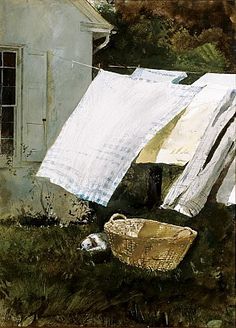
Such an idyllic scene. Clean sheets blowing in the breeze. The sun warming the fabric (100% organic cotton, I’m thinking), filling it with the scent of the outdoors.
These days, with Americans disagreeing on issues from bathrooms to vaccines, you’d think clotheslines (their existence, their value, their esthetic) would be pretty far down the list of causes to examine. Turns out, our planet’s economic and environmental future hangs on an unlikely thread: the clothesline.
Did you know that your clothes dryer uses more electricity than your refrigerator?
I didn’t either.
Northwest Power and Conservation Council estimate households in the Northwestern states use 4.3 % of their annual electricity consumption to dry laundry. Compared to the 3.5% from refrigerators. (They didn’t mention if those were self-defrosting refrigerators.)
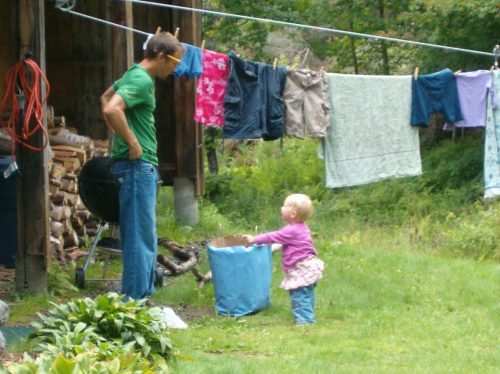
Here’s how the issue settles out.
On the pro-clothesline side, we have Project Laundry List out of Concord, NH. Their goal is “to make air-drying and cold-water washing laundry acceptable and desirable as simple and effective ways to save energy.” There are other groups, I’m sure, but Project Laundry List has a website and a Facebook Page (Drying for Freedom).
According to the website grist.org, The New York Times has reported that the typical US household could prevent 1,500 pounds of carbon dioxide from entering the atmosphere each year by simply turning off its dryer and hanging the clothes outside in the sun. AND, as an aside, dryers cause more than 12,000 residential fires annually.
[editorial note here: I could not find this NYTimes article).
On the down-with-clotheslines up-with-electricity side, we have various homeowner associations, condominium boards, and trailer park owners, all worried about property values, who have established bans on outdoor clotheslines across the country.
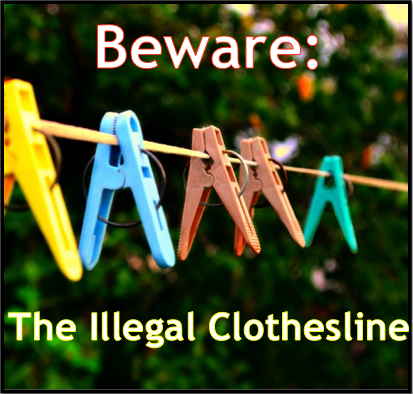
We also have the electricity industry — this is where the politics comes in — which has, from 1945, promised “we could live better electrically.” The YouTube link to the 1950s era commercial is 3+ minutes. But it features some familiar faces. Really, take a peak.
And for you diehard fans, here’s another with the same “cast,” this one featuring electric lighting.
We did live “better” too. We had toasters and dishwashers and vacuums and irons and heaters and coolers and ovens and ranges and power washers and toys.
But it was based on a dream. An electric dream that was never to end, and in the process, increasing the demand for coal across the globe where developing nations began their own love affair with an electric utopia.
And has there ever been a Utopia that ended well?
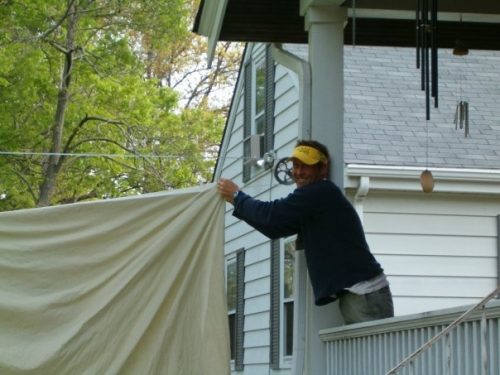
Fast forward to the 21st century, and we have the British documentary, Drying For Freedom, describing it all.
“It seems like such a mundane thing, hanging laundry, and yet it draws in all these questions about individual rights, private property, class, aesthetics, the environment,” said British filmmaker Steven Lake, who crisscrossed the world to unravel the reasons and consequences for the banishing of the clotheslines in favor of tumble dryers.
Here’s how it bills itself: From the laundry-less gardens of sunny California to India’s communal open air Laundromats, DRYING FOR FREEDOM is a voyage into the new environmental battlefield where money, status and class come first and our planet is a poor second.
You might want to check out their newer trailer here.

Do you live in a “right to dry” state?
Let’s start with the six states that have declared any community ban on clotheslines to be void and unenforceable.
Colorado, Hawaii, Maine, Vermont, Florida, Utah
(Yeah, Vermont!)
If you live in one of these six states and your homeowner’s association, condominium board, or trailer park owner tries to ban your clothesline, You Don’t Have To Do It!
While the legal distinction is beyond my pay grade, these 14 states have “solar access laws” on the books to protect “solar drying.”
Arizona, California, Illinois, Indiana, Louisiana,
Maryland, Massachusetts, Nevada, New Mexico,
North Carolina, Oregon, Texas, Virginia, and Wisconsin
If you live in any of these additional fourteen states, you are free to use “solar drying” to your heart’s content. Just show the arresting officer this blog.

Alas, those of you living in one of the remaining 30 states. I’d love to hear from you if you hang laundry outside to dry. And, even if you don’t.
Just remember, the next time you do your laundry,
Our future is hanging on the line.
(cute, huh? It’s not original with me.)
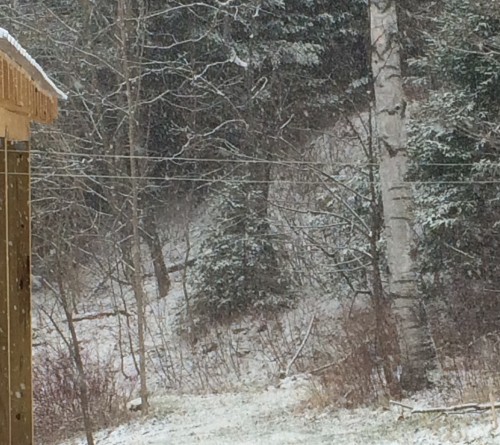
How about you? Where do you stand vis a vis your own clothesline?
Ian Mathie
Ban clothes lines? What a crazy idea. At the same time, we have a long tradition where I come from of not putting your washing out on a Sunday, but that’s for different reasons to do with going to church, which seem to be on the wane.
I live in a village where we regularly get power cuts, so drying all the laundry in a dryer is not very effective. We have one, sure, but it’s now 36 years old and costs much less than our fridge to operate because of how little it is used. Seeing rows of washing in back gardens is a normal part of our environment and anyone who doesn’t put washing out immediately provokes speculation as to their cleanliness. Villagers love to gossip, so this can get interesting.
The other thing to consider is the damage tumble dryers do to the clothes. Their intense heat leads to additional shrinkage and shirts that once fit soon don’t if dried to often this way. Conversely, being blown about in the wind stretches out the fibres and makes the fabric relax, so any shrinkage caused by washing is released and the garment retains its shape.
And when all is said and done, if we really don’t like the look of neighborhood lines of washing we have a simple solution – we light a smoky bonfire in the back garden. It’s amazing how quickly the lines of washing get cleared!
Janet Givens
I smile at your smoking bonfire, Ian. And the ban for Sundays resonates. We have a Sunday ban on motors (i.e., lawn mowers and power saws) in Chincoteague. It feels nice to have one day each week set aside to be special. Of course, where I live, no one would know whether we were sawing down all our trees or hanging our clothes to dry whenever we did it. We are quite isolated. But with civilization comes compromise, (so I’m told).
Marian Beaman
What a thorough exploration of line drying. Both you and Ian make a fine case for continuing this now-quaint tradition.
I have two parallel lines in our back yard and frequently use it for sheets and towels after they’ve tumbled in the drier for 5-10 minutes (to get the wrinkles out).
In fact, I have extolled the virtues of line drying in a blog post some time ago: https://plainandfancygirl.com/2013/10/03/clean-sheets-its-a-breeze/
If you check back to my Facebook page April 2, you’ll see a 26″ video of my exercising my freedom. Yes, I live in a right to dry state, but when we move later on this year, I’m sure the HOA will scotch the idea. I want to check out your link to the documentary, Drying for Freedom – clever pun. You make the idea of line drying absolutely enticing, Janet.
Ian Mathie
You talk of two parallel lines in your yard, Marian, but what about the whirlygig washing line? Perhaps we need also to consider the merits and advantages of different types of lines.
Straight lines need to be correctly aligned to take best advantage of the prevailing wind. Whirlygig lines can accommodate any wind direction, plus they enable more washing to be dried in a small space. I find also that, because they are generally collapsible, they are less of an eyesore i the garden when not in use.
Straight washing lines are much better for swallows to gather on before they begin their migration as they prefer to sit in long lines than in close clusters. Whirlygigs that have not been folded, on the other hand, are better for flocks of sparrows.
Janet Givens
Sounds like you have done a serious study of this, Ian. Why does that not surprise me? I have parallel lines, but I’m intrigued by the idea that I might want to accommodate wind direction. I never thought of that before. Of course, many days, my clothes hang in the basement! I have two collapsable wooden dryers down there. Amazing how much they can hold. But then I need to turn on my electric dehumidifier! (which is now powered by solar arrays on my roof). It’s all connected.
Marian Beaman
Sorry, Ian, we “inherited” the clotheslines when we bought the house and didn’t want to unearth 4 iron poles to accommodate a whirligig. I see you do praise the straight ones for gatherings of swallows. Good for you, a bird lover too, I see!
Janet Givens
I’m so glad, Marian. I hope we can entice Cliff to enjoy its many benefits. I also wish I could find the photos I took of each of my sons hanging laundry on a recent visit. I know I posted them to FB, but I can’t find them. I love your comment (was it here or in your linked post?) about the rhythm of life. We do appreciate it more as we change our perspective. And, when you check out the documentary (I think the trailers are the only ones available for free) check out the link under “we could live better electrically.” above. It’s really a hoot.
Merril Smith
It’s totally ridiculous to ban clotheslines. That said, I always use the dryer. Our clothes would covered in bird poop (and right now pollen, too), if we hung them outside–requiring more washing. And, I must admit, I like soft from the dryer clothes and towels. I’m sure we could have a more energy efficient one though.
Laundry is always a popular blogging topic.
But the clothesline also reminded me of this project: http://www.clotheslineproject.org/
Janet Givens
I would agree with you on the towels part. I do enjoy nice soft towels. But I envy you your bird “problem.” We only get them in the front yard, at our feeders between December and April (we must take them down May – November because of the bears). Your spring pollen reminds me of Chincoteague; I’d never bother to wash my windows until after the pollen fell in May. Now that I’m not down there, they just don’t get washed at all. (sniff, sniff). Thanks for hanging out over the clothesline this morning.
Susan Jackson
I am right there Merril Smith–I use enough medicine for allergies and I am allergic to all grasses and most trees–pollen is my enemy and I don’t need it in my bed–although I wish I could hang out my clothes and sheets, but–hang them out and use steroids or dry them and don’t use steroids–easy peasy
Janet Givens
Thanks Susan. You raise an important point. Electricity has improved our lives and you are a good example. My son Dave has a slew of allergies too; I’ll have to ask him how he manages. I’ve never thought of the connection before. Thanks for that.
Joan Z. Rough
I adore line dried clothes and sheets. They smell so fresh and lovely. But like Susan and Merril, we have a huge pollen problem here as well as a backyard full of birds. I love the birds but not the pollen, so with just the two of us I use the dryer a couple of times a week.
But banning clotheslines? Dumb idea!
Janet Givens
Another backyard full of birds. I swear, I need to move into town to start seeing some. My neighbors explain it by saying there’s too much good stuff deeper in the surrounding woods, so they don’t bother to come close to the house. Only when we have our feeders out. (We did have a young bear here this morning, though. Too young to know we have Sasha; it’ll not make that mistake again. And it was gone before we even knew so we never saw it. How do we know, you ask? It left tracks in the SNOW!!!)
Laurie Buchanan
Some of my fondest memories are conversations I had with my mom while we hung the laundry out to dry.
Janet Givens
I’m so glad this brought back such a fond memory, Laurie.
Sharon Lippincott
Janet, I miss clotheslines! But we are also in the pollen avoidance camp. I do dry lots of heavy things like jeans inside, along with sweaters and special t-shirts, and sometimes hang damp shirts on hangers. Based on the fuzz on the filter and pilled fabric, I know how badly dryers beat things up. I’m working on ways to do more air drying inside the house. In the winter the humidity is welcome, and my new front-loading, water-conserving washer leaves the clothes almost dry enough to iron anyway, so they dry in a flash, whichever path I take.
I’ve taken pictures of clothes drying around the world. The innovative Chinese use balcony racks levering drying lines over the street. Some cities have pullies outside windows with lines crossing the street. But plenty of places still have posts and wires.
Janet Givens
I love the idea of seeing how clothes dry around the world, Sharon. Might you put them together into a post one of these days? My friend Ellie, who now lives in Tel Aviv commented on the FB link to this post about how it’s done there. And done it is! Apartment house builders account for it when the building goes up! Imagine that here in the USA!
Jane Roberts
I only dry my washing on a clothes line, if it is wet I don’t do any washing! I don’t own a tumble drier and I always use cold water to wash the clothes in. I do live in Spain though, in the country so have plenty of room for a washing line and plenty of sun and wind to do the drying for me. I am afraid I have in the past ruined many an item of clothing by tumble drying, so don’t miss having one!
Janet Givens
Hello Jane, Welcome. Thanks so much for sharing your experience there in Spain. I wonder if how one’s neighbors dry clothes makes a difference. When one has neighbors. Really wondering how much of a cultural decision this is, rather than an individual one. Hmmmm.
Jane Roberts
I think here in my part of Spain most people dry outside certainlymall my neighbours do, and even those in flats in the towns hang the washing on the balconies, or even out of a window!
Kathleen Pooler
Janet, You have presented another in-depth exploration of a mundane topic and turned it into a fascinating discussion. I had no idea that clotheslines were legislated. That seems a bit far far-fetched but you’ve helped me understand the rationale.The idea of clothes lines conjures up all sorts of images in my mind. I love smell of sheet and towels that have been lined dried in the fresh air but I opt for the dryer out of convenience. Another memory it taps into is the family ritual (from the Italian side of the family) of hanging rosary beads on a clothesline the day of a wedding to ward off the rain. (It works!)
Janet Givens
Mundane, I know! I so expected this to be more of a funny post about a somewhat automatic Monday morning ritual. Silly me. But the further I got into it, the more serious it became. I love the quote from the film maker and plan to watch his documentary one of these days.
I love doing laundry, I realize. I love the sorting process before hand and the folding process at the end and all the parts in between. Always have. Not so big on dusting, however.
So glad you stopped by.
Janet
Jane, that’s a great image: clothes flapping in the breeze, against colorful Spanish houses. Sounds exotic. In Kazakhstan, we hung our laundry all year round. I’d never realized laundry could dry in sub freezing temperatures.
Frank Moore
One of the hazards of line drying clothes here on the Shore – – particularly this time of year – – is the operation of Moore’s Law. No, not that one dealing with a computer’s processing power and density of integrated circuits. This Moore’s law, which is: “Within 30 minutes of hanging your clothes on the line, the wind direction will change to come from the direction of the adjacent farmer spreading chicken manure .”
Janet Givens
So, you don’t enjoy eau d’merde de poulet? Takes all kinds . . .
For a rocket scientist (I know; I know) you are too funny
Charlene
In University a History Prof spent an entire three hour class on the subject of laundry, how some women lined up which items to put out first, and were criticized if they didn’t abide by that area’s formula, how different areas of the world handle laundry. What I recall is writing back to the Prof on my paper “I had no idea laundry was an entire culture!” From the responses to your blog here Janet, it would seem we may have changed our clothes, but the culture of laundry continues! Thanks for a fun idea.
Janet Givens
And thank you, Charlene, for adding much to the conversation. The Culture of Laundry; I love it.
Shirley Hershey Showalter
Janet, you’ve obviously touched a hot button topic.
I grew up learning to hang laundry in the way my mother taught. Large items first and on the outside of the four lines. That way the smaller unmentionables were not blowing in the breeze for all the world to see.
Today I use a dryer but our neighbor downstairs has a clothesline with our permission. Have no idea whether that breaks any laws or community guidelines. But am willing to be civilly disobedient if we are. We do much less laundry than most folks. Usually two loads/week. If chosen to simplify that way.
Janet Givens
Thanks, Shirley. I’m trying to picture “neighbor downstairs” and struggling there. Does she live in your basement?
I’m also picturing you being “civilly disobedient,” and all that keeps coming up is you carrying a placard with the word “please” on it. Sorry; it just won’t go away.
We choose our battles, certainly. But at least we’re all fighting the same good fight. Onward and upward. Thanks, btw, for posting the Goshen commencement service. I’d never heard of Carrie Newcomer before. Marvelous. She sings the kind of music I used in my therapy. Tried to get her in Pandora but not yet up there.
Linda Hoye
Excellent post, Janet. I’m thrilled to hear that some states have given the green light to this. When we lived in WA our homeowners association had a ban on clotheslines much to my annoyance. Now that we’re back in Canada we find the same intolerance for line drying. It makes little sense to me. I use a clothes rack on my deck and, in the summer months, don’t use my electric dryer at all. We do what we can.
Janet Givens
You know, I went for years drying my clothes in my brand new GE dryer and didn’t think anything of it. Yet today I rarely use the dryer. If I can’t hang them outside, I’ll hang them in the basement. I feel like my inner-cheap-Scot has taken over my life. And that’s fine with me. Are you in the west or east part of Canada? (does anyone live in the middle?)
Ian Mathie
Nobody LIVES in the middle of Canada, Janet. A few people exist there, but that’s not LIVING!
As for drying your washing in the basement, that’s missing ot on one of the major benefits of using a line – Sunlight. It’s not only good for drying th fabrics, but the ultra violet also dose its bit to wards sterilising your washing. This, together with the action of moving air, invigorates your clothes, softens the brittleness that can result from washing and the chemicals in detergents, and shakes out many of the creases that would otherwise have to be ironed out. Your inner- cheap-Scot should recognise and grasp these benefits as the sunlight and the breeze are still free!
Janet Givens
But Ian, living in the UK as you now do, you should be particularly cognizant of the fact that sunlight is not always available. Hence, it is on those days here in the beautiful Northeast Kingdom that my clothes line up in good order on their little hand made wooden racks in the basement! I could send you a picture?
Ian Mathie
Even in ordinary daylight the ultraviolet penetrates most of the clouds. If they’re too thick for that It’s bound to be windy, so you get the breeze effect. Win/win all round and it stops the basement smelling damp and laundryish.
all that drying has to go somehwhere: far better for it to be carried away with the breeze.
Janet Givens
Is this the part of the conversation where I admit I’ve got an electric dehumidifier going in the basement most months of the year? We have furniture stored down there and a son who’s allergic to mold. hence…
But even without that, do you not have rain in the UK, Ian?
That’s a rhetorical question. I’ve been to London!
Ian Mathie
Sure we have rain . That’s how we rinse the washing! It saves on water bills and the laundry dries between showers.
You just have to be nifty getting it in!
Tim Fearnside
A little late to the discussion, but am glad I found this post. This has been on my mind lately, and again today, as my washing machine spins in the background and I look out at another perfect 70-degree Spring day in Boise. Regrettably, I haven’t had a clothesline since I was a kid, growing up in rural Ohio. I have no good excuse. ‘Time to end this absurdity . . .
Janet Givens
You are in Boise! I didn’t realize that. Some of my favorite people live in Boise. And my sons live in Ohio, though unfortunately far from rural. Small world.
Good luck with the clothesline. I’ve found myself with two foldable clothes racks that take up much less space and allow the tractor to pass through. I kept buying clotheslines only to find they stretched!!! How could anyone make such a thing?
Thanks for stopping by, Tim.
Laurie Buchanan
Tim – I live in Boise too. Nice to meet you, neighbor!
Tim Fearnside
Hi, Laurie! Nice to meet you as well :). Thanks, too, for checking out my blog. I will be doing the same. Thanks, Janet, also ^^. Boise indeed has some wonderful folks. I’m not sure I’d live anywhere else, but if I did, Vermont would surely rank high on my list. Best regards! – T
Ian Mathie
So, do you have clothes lines in your back yard in deepest Idaho?
Laurie Buchanan
Ian – We live in the carriage house of one of the Russell Mansion (circa 1865) in the Warm Springs historic district. If we hung laundry out to dry, I assure you we’d be strung up with the clothesline!
How about you?
Ian Mathie
Here in the country we can have whatever clothes line we like. We have a rotary one in the garden, for convenience, which at the moment is festooned with an array of dog toys that have just had their weekly wash. It adds a bit of class to the neighbourgood laundry, but actually can’t be seen from anyone else’s garden, so the effect is slightly wasted.
Laurie Buchanan
Ian – I love it!
If we hung Willa’s freshly laundered toys from a clothesline to dry, she would walk beneath them (thinking it’s a game) and remove them one-by-one. An Irish Wolfhound, Willa is a rather tall girl!
Maddie Walsh
Love this post, thx for the share!
Janet Givens
You are very welcome, Maddie.
Cathi
This is soooo interesting. I’ve often thought about setting up a little clothesline in my back yard (in the suburbs). I remember the fresh smell of my clothing back in the says when my grandma hung my clothes and linens on her line to dry. Beautiful memories.
Janet Givens
This was such a fun post to do, back then, Cathi. I’m glad you found it. Welcome. I’m so enjoying your creative Yellow Brick Road posts. I hope others will check out your blog. And, I hope you go for the clothesline.
An Historian
I will admit, my stance comes from both the sustainable and the clothing side- drying your clothing in a dryer is one of the worst things you can do to clothing. People complain that their clothing doesn’t last; well, part of the issue is that you purchased a t-shirt for $4, but the other part is that you continually shoved it into a hot cylinder that breaks down fibres at an accelerated rate. I am thankful that my parents always hung their clothing, because I’ve known nothing different. It uses less electricity, saves you ironing time, and preserves your clothing. The only argument for dryers in 90% of clothing is just laziness :/ Rant over!
Janet Givens
Rant away, Jessica. We love directness and clarity! Thanks for stopping by. I am concerned that your recent blog link did not appear. Did you see the CommentLuv button?
Janet Givens recently posted…Where Are You in the Cycle of Experience?
Fancy
I have a clothesline! A very weather dependent device I must say

Fancy recently posted…A Peek into Peppa Pig World
Janet Givens
Yes, it can be. Since I’ve been back in the USA, I’ve gone back to hanging outside only in nice weather. While living in Kazakhstan though I got quite used to hanging all year long. The clothes dried surprisingly well even in the midst of winter. (It was a dry snowfall).

Janet Givens recently posted…Where Are You in the Cycle of Experience?
ellen best
My Linen on sunny or breezy days hang on two parallel lines until iron dry. Once semi damp a two minute burst in the tumble softens and finishes them off; folded quickly saves electricity by not ironing.
In inclement weather, the tumble begins with two dryer balls inside (no need for conditioner or extra packaging waste or chemicals down the drain). If it brightens, the washing is (now soft) and is finished on the line., to smell sweet. In winter and persistently bad weather days , the dryers on clothes folded job done!
Janet Givens
Ah, the best of both worlds philosophy. Nice one, Ellen.
Janet Givens recently posted…Where Are You in the Cycle of Experience?
Amelia
Condo association here declared that condos could not enforce banning drying on balconies. If any had that in their by-laws they had to be changed.
Janet Givens
It’s great to know Halifax, Nova Scotia is on top of this. Thanks, Brenda. I wonder if that’s limited to Halifax only, Nova Scotia only, or throughout Canada? Here’s State laws oversee local laws. And Federal laws top State laws, of course. Thanks for weighing in.
Janet Givens recently posted…Where Are You in the Cycle of Experience?
Kelly
I grew up in Northern Nv, and both my grandmother and mother had clotheslines. It was normal and they both expected to have one wherever they lived. If they moved to a new house, a clothesline went up fast. I move to California@18 yo after joining the Air Force. Purchased my house in 09 and ran to buy a clothesline. Loved it. It was the kind that pop open and spin. When my realtor came to my house in the spring to sell, she stopped dead in her tracks when she saw my Clothesline and asked”What is that?”, as if she’d never seen one before(California born and raised she probably hadn’t). She took it down, but left the post in the ground. The family whose offer I chose asked me about the clothesline. I told them the realtor made me take it down and I could take it to the dump if they didn’t want it. The husband about came out of his seat telling me”No, My wife loves it. We’re from Guam and we hang our clothes out”. I had a stupid moment and purchased a townhouse in an HOA in Southern Nv, where they say we can’t have a clothesline, YET my neighbor had rugs and swim trunks hanging on our shared wall. Grossed me out but I let it slide. It happened again, I let it slide. I came in my house one day and you can see right out the sliding door. They had SHEETS HANGING ON THE SHARED WALL, ALMOST TOUCHING THE GROUND ON MY SIDE, but we can’t have clotheslines. I pushed those sheets back up toward their side, and they immediately took them inside. I’m going to exercise my right to hang a clothesline in my private yard, regardless of the HOA rules, since it seems NV trumps HOA. HOA is responsible for the front yards, and they’re not taking care of mine. Sprinklers got turned off(I believe by Landscaping) plants, bushes and the tree died. HOA said they’d be replaced in Sep.We’re in Oct and they’re ignoring me, so while I find somewhere to move to, I’m going to hang a clothesline. Suggestions for those who have never had one. If you’re going to use Wooden Clothes Pins, do NOT leave them outside all day and night. Rain tears them up. You can make or buy a clothespin holder, or cut a milk jug to hold them. The holder hangs on the line(the metal part, not the actual line because that weights the line down) and is right there when you need to use a pin or take them down. Don’t leave them on the line when you take your clothes down either. Again, it ruins your clothespins. My mom still leaves hers outside, even after I bought her a cute holder, and she buys more clothespins than I do Happy line drying everyone
Happy line drying everyone 
Janet Givens
Hello Kelly and Welcome. If you are in California, you are in a “solar access” state and line drying (ie., solar) trumps any HOA rule. So, have at it. I wish you good luck.
Here’s an excerpt from the post:
six states have declared any community ban on clotheslines to be void and unenforceable: Colorado, Hawaii, Maine, Vermont, Florida, Utah (Yay, Vermont!)
14 states have “solar access laws” on the books to protect “solar drying.” —
Arizona, California, Illinois, Indiana, Louisiana, Maryland, Massachusetts, Nevada, New Mexico, North Carolina, Oregon, Texas, Virginia, and Wisconsin. If you live in any of these additional fourteen states, you are free to use “solar drying” to your heart’s content. Just show the arresting officer this blog.
Janet Givens recently posted…Happy Anniversary, Woody